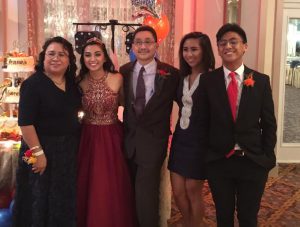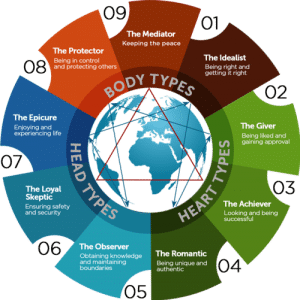They say love is blind. But not everyone is all that jazzed about groping in the darkness for the perfect partner, and so a lot of people are looking for some sort of sign that the person they’re eyeing up is right for them. This is especially true now that we’re often relying on meeting people on dating apps, rather than more old-fashioned and personal ways. In fact, according to one study, by the end of 2019, around 77% of adult online users reported having gone on a date with someone they had met online.
So what is the criteria for some as they swipe their way through those sites (other than a sexy selfie), or as they go on date after date? Well, it can feel tough to find the right person, so a lot of people rely on some sort of guidance that will tell them if they’re compatible – and we’re not talking about their mother’s advice. No, we’re talking about relying on star signs, personality types, and love languages to help them find THE one. Now that Valentine’s Day is upon us again, we wanted to look at these methods for sorting out mates, and ask if any of them actually mean anything.
Star-Crossed Lovers

What’s your sign? For a while, that was a seriously cheesy and outdated pickup line, but now astrology – and checking out your potential lover’s star sign – is making a comeback. One study, for example, found that among the women they spoke to, 72% didn’t think astrology was just superstition and almost 90% said that they find out the sun signs of people they have relationships with. 78% had read a book concerning their sun sign in love. Another small survey of young men found that 70% read a horoscope column once a month and 51% valued its advice. 98% knew their sun sign, 45% thought it described their personalities, and 25% said it can make accurate forecasts.
And in addition to all that, traffic to astrology websites has exploded, with one site reporting a 150% increase recently, and dating apps like Bumble now have an option to include your star sign in your profile. Why this turn back toward the mystical and mysterious? J. Walter Thompson’s Intelligence Group’s 2016 trend report called “Unreality” put it this way: “We are increasingly turning to unreality as a form of escape and a way to search for other kinds of freedom, truth and meaning. What emerges is an appreciation for magic and spirituality, the knowingly unreal, and the intangible aspects of our lives that defy big data and the ultra-transparency of the web.”
Sounds about right: maybe we do have a desire to tap into that unknowable part of ourselves (and others) in this web-weary world. But does it matter if you’re a supposedly organized Virgo, and your date is a creative and crabby Cancer? Well, it might be fun to read up on, but now science has actually checked out whether astrological signs actually have an impact on relationships, and it’s given an emphatic shake of its skeptical head.
A team from the University of Manchester did a study in 2007 called “Ten million marriages: A test of astrological ‘love signs’”, analyzing 10 million marriages, and inferring astrological signs from couples’ birth dates. Their analysis? True believers, brace yourselves:
“This research shows that astrological sign has no impact on the probability of marrying – and staying married to – someone of any other sign. For decades, popular astrologers have promoted the idea of ‘love signs’: compatibility between partners with certain combinations of birthdays. If the more than twenty million married people in England and Wales offer any indication, however, lonely hearts who worry about the zodiac are wasting their time.”
What this study didn’t look at, though, was the impact that believing in astrology could have on people’s partner picks. Meaning, you might truly believe that you’re meant to be with a water sign because you’re an earth sign, so that’s who you’re searching for. And who’s to say? Astrologist Juliana McCarthy makes a tempting point when she says that we can use astrology as a guide for love. In her words: “the remedy for any sign’s neurosis is the enlightened qualities of the opposite sign. Earth signs can provide balance, pragmatism, and grounded-ness to water signs, while water signs can provide fluidity, spirituality, and emotional depth to earth signs. Air signs can fuel fire signs with brilliant ideas and intellectual stimulation, while fire signs help bring air signs’ mental energy into action.”
The catch? You have to have your whole “natal chart” done, which includes things like knowing your moon sign and the “positions” of your planets, not just know your sun sign. Sounds like a lot of work and a lot of information to ask for from a Tinder date, so our conclusion on this one? Astrology is fun, but it’s better to keep it light and find out other information about your date before you worry if their birthday will drive you apart.
What Are Your Initials?

Did you read the above and totally pooh-pooh the unscientific nature of astrology? Is finding compatibility more “scientific” for you? For example, does it mean knowing the results of your Myers-Briggs Type Indicator (MBTI) personality test? This test claims to measure how introverted or extroverted, sensing or intuitive, thinking or feeling, judging or perceptive you are, and if you take the test, you’ll end up with a set of mysterious initials (like ESTP or INFJ) that you’ll often see attached to online dating profiles.
A lot of people swear by MBTI compatibility charts in making love matches, but the truth is that psychologists are actually split when it comes to any evidence backing up the usefulness of this test. For a lot of them, using the MBTI to assess your potential partner is not all that different from using their astrological sign. According to Skeptoid:
“One obvious trait that the MBTI has in common with horoscopes is its tendency to describe each personality type using only positive words. Horoscopes are so popular, in part, because they virtually always tell people just what they want to hear, using phrases that most people generally like to believe are true, like ‘You have a lot of unused potential.’ They’re also popular because they are presented as being personalized based on the person’s sign. This has been called the Forer Effect, after psychologist Bertram Forer who, in 1948, gave a personality test to his students and then gave each one a supposedly personalized analysis. The impressed students gave the analyses an average accuracy rating of 85%, and only then did Forer reveal that each had received an identical, generic report. Belief that a report is customized for us tends to improve our perception of the report’s accuracy.”
And as the Guardian points out, the test can be problematic because it kind of boils you down to one or the other of something: “the MBTI seems to rely exclusively on binary choices….For example, in the category of extrovert v introvert, you’re either one or the other; there is no middle ground. People don’t work this way, no normal person is either 100% extrovert or 100% introvert…”
That’s true, so our conclusion? Go on, take the test, and read up on what that person who you like’s initials mean, but don’t put too much stock in the results.
Speaking the Language of Love
Finally, some of you looking for something beyond the fun of astrological and personality quiz assessments are all in on the idea that finding someone with the right “love language” is the true way to find a partner who understands your needs. And, unlike astrology, love languages are rooted in our own feelings and experiences, not based on arbitrary positions of stars and planets, so maybe there’s more to them?
So what are these so-called love languages? Well, they are five ways that people express themselves to their partners: words of affirmation, quality time, physical touch, acts of service, and receiving gifts. According to Salon.com, “For some reason, in the 2010s, the love language concept became explosively popular — to the extent that identifying one’s love language was considered a categorical, dating-profile-ready personality trait as important as astrological sign or Myers-Briggs personality type.”
And with that being said, the idea of love languages is actually slightly more supported by a lot of professionals than the other two types of compatibility measurements – but not because it predicts compatibility. Rather, it’s because understanding your partner’s language shows investment in them, and can help foster appreciation and resolve certain little conflicts.

For example, if one partner’s love language is words of affirmation, they’ll probably expect that kind of thing in return, and will want to hear things like “I love you,” and be complimented. But, if the other partner is all about acts of service, their efforts to do chores and cook dinner for their beloved might go a little unnoticed, and they won’t get those things in return. So understanding that these things are what your partner needs AND how they’re telling you they love you, can go a long way toward building a happy relationship.
According to psychotherapist Erin Miller, “If nothing else, the [love languages] give the person and the couple something to point out and reflect on. Obviously, it’s not like a one-size-fits-all, instant repair — but it is something to be mindful of, because at the end of the day by investing in that you’re investing in the relationship.”
She says it’s only problematic when it is relied upon too heavily, forced on your partner, or even weaponized: “I think when people are too heavy-handed with it and are trying to really force it on their partner, that’s when it becomes counterproductive. Then resentment builds and those partners end up just feeling either incompetent or resentful…It’s the same kind of thing with people who get into astrology, it can be really amazing for self-reflection. But it becomes a problem when you start using it as a way of putting blame and shame on your partner for not understanding or investing enough in your love language.”
Our conclusion on this one: it’s not a way to determine who you’ll be compatible with before you meet them, but understanding the love languages of yourself and someone your dating can actually be a way to bring you a little closer together, if you are both on board with doing some reflection on how you show your love.
In the end, unfortunately, there’s no predicting who you’re going to click with, or fall head over heels for, or stay with forever and ever. The above ways of looking for love can be fun, or can even help you to have a more understanding relationship with a potential partner, but really all you can do is get out there, meet people, and get to know them IRL (gasp!). Who knows? You might be looking for a Virgo ESTP whose love language is words of affirmation, and you might end up with an Aquarius INFJ who’s totally into quality time. After all, Cupid’s arrow works in mysterious ways.



